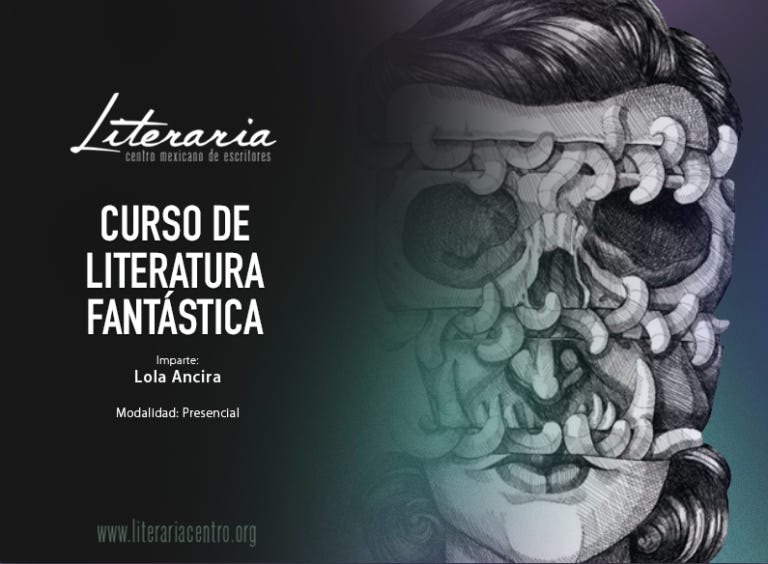One of the most interesting literary discoveries I made last year came about through taking two ‘literatura fantastica’ courses in Spanish. I’d been meaning to start reading in Spanish again, and also wanted to read Mexican and Latin American writers, so I was on the lookout for something to kick-start that.
I’d been put off taking literature courses by a bad experience when I first arrived in Mexico City. I signed up for a course on detective fiction, expecting to be stimulated by discussing Mexican crime writing,but was disappointed when the tutor of that course handed out photocopied translations of Agatha Christie and Conan Doyle, and had us sit around reading them aloud for most of the time we met. It had been a complete waste of time and money, and an example of how not to run a course.
Casting that memory aside, I was excited when I came across the first ‘Literatura Fantastica’ course. It seemed to be very promising, so I signed up.
That first course was held face-to-face at Centro de Creación Literaria Xavier Villaurrutia in Mexico City, and the tutor was Meryvid Perez,an upcoming writer of the genre.
We met four Fridays in a row, and were encouraged to write and submit our own short story for the last session. The course was great. Like in that detective fiction course, we were handed stories to read aloud (typical of literature courses in Mexico?), but at least they were all originally written in Spanish, and that was only part of the time during the class. The rest of the class, we were introduced to the genre by the tutor and then encouraged in a discussion.
The first session was dedicated to discussing what ‘Literatura Fantastica’ was and what it was not. We were asked to put forward our ideas.
“Fantasy?” “Magical Realism?”
When I started the first course, I assumed ‘Literatura Fantastica’ would translate to English as ‘Fantastic Literature’ or even that it was the same as ‘Magical Realism’, but not so.
It wasn’t Fantasy. Fantasy is a genre that involves supernatural or magical elements, and often includes imaginary places and creatures. Fantasy fiction is usually separated from reality.
It wasn’t Magical Realism. In Magical Realist fiction, the fantasy or magical elements are accepted as being normal, and the magical elements are usually there to make a point about reality.
I found out that the best translation for ‘Literatura Fantastica’ was either the French term ‘Fantastique’ or ‘the Uncanny. These stories are set in a world that is recognisable (unlike most fantasy fiction), where there is usually a single supernatural or uncanny element, and the reason for this is never explained - it is left up to the reader’s imagination. Som, that’s ‘Literatura Fantastica’ - fiction with uncanny or unexplained elements.
The second course in Literatura Fantastica was held online, organised by Literario Centro Mexicano de Escritores,tutored by Lola Ancira, a well-renowned Mexican writer of the genre.
In this course, the group was smaller, and the tutor had more time to explore the genre in more depth. And, no reading aloud! She asked us to read short stories for homework, and we discussed them during the class. We were also encouraged to write - a total of three stories, which she critiqued.
The Literaria Centro Mexicano de Escritores has an online magazine, and the writing tutor asked me if she could submit one of the stories I wrote during the course. You can read that published story here in Spanish, but I have also provided the English translation below.
The uncanny genre is fascinating, and I like to think of the first part of the Many Worlds Apart trilogy as being an uncanny tale. The plot of that book, The Snowman, revolves around the appearance of a mysterious portal in the back garden of the main character’s family home. The second part of the trilogy, What Happened to you, Gordon? is a tale about time travel, and the third part, Consequences (available in May 2025) is - well, it’s a different kettle of fish.
Want more of Baldric’s Trousers? Then subscribe to receive regular updates. Thanks for reading.
Mrs. Yapp and Mrs. Lamb
1
It was freezing in the High Street. Mrs. Dorothy Yapp fastened the top button of her beige winter coat and tightened her headscarf. The last thing she wanted this time of year was to fall ill.
“Button up your coat too, darling,” she said loudly, “or you’ll catch your death of cold.” She stopped in front of Lamb’s the Butcher’s, wondering if she needed anything. “What do you fancy for dinner tonight? Shall I get those rump steaks you like?”
Her husband didn’t reply. No, there were a couple of pork chops in the fridge that needed eating. That would be more than enough. What they did need was some vegetables. Yes. An onion, some mushrooms, and carrots.
“Come on, don’t keep me waiting,” she said, waving her hands with exasperation. “Green’s closes in fifteen minutes!”
2
“Two rump steaks,” said the butcher, placing the meat on the counter. As was his custom, he left the prime cuts visible on the unwrapped greaseproof paper for his customer to see. “Will you be wanting anything else, madame?”
Mary stood behind the customer, but she wasn’t paying attention. Instead, she was staring outside, watching as an elderly woman wrapped up in a beige coat, and wearing a matching headscarf walked by. “Unbelievable,” she said.
“I’m sorry, did you say something?” the butcher asked. “Is there anything the matter?”
The woman in front of Mary turned to face him. “Oh no, it’s just that poor lady outside.” She inspected the meat and nodded. “I’ll have half a dozen pork sausages too, please.”
Mr. Lamb looked out of his shop window and waved at the woman outside, who returned the greeting before moving up the street. “Who do you mean? Surely not Mrs Yapp?”
“Do you know her?”
“Yes, she’s a regular customer,” said Mr. Lamb, placing a string of six sausages down on the counter on another sheet of butcher’s paper.
“Irregular, more like it,” said the customer, sniffing the pork sausages laid out in front of her. “The way she walks about talking to herself. Are you sure those are fresh? They smell a bit funny.”
“Freshly made this morning, madame. It must be the sage. It’s a new recipe.” The butcher stood with his fingers on the sides of the paper, waiting for the go-ahead from the customer to start wrapping the parcel.
She nodded and he neatly folded the paper over the meat and stuck a piece of tape to fasten it. Mary watched as the customer put the packets of meat in her string-bag.
The butcher added “She’s not talking to herself, by-the-way. She’s speaking to her husband.”
“But there’s nobody there,” said the customer.
“Poor thing,” the butcher said. “Her husband passed away last year, but she refuses to believe he’s gone. Claims she still sees him.” He sighed. “I know how she feels though. Grief plays all sorts of tricks on people. I still talk to my wife, even though it’s been two years since I buried her.” Mr. Lamb sighed. “Mind you, I don’t say anything aloud. Only in my head. I admire Mrs Yapp in a way.”
“Admire her? How come?”
“For having the courage to keep him alive, I suppose. For talking to him the way she does, in spite of what other people might think. It’s her way of dealing with grief.”
“People are strange,” the customer said as she left the butcher’s shop.
3
Mary took a seat at the dining table opposite Mr. Lamb and daughter, Grace. She smiled as they tucked into their steak with relish.
“How was school, dear?” Mr. Lamb asked.
“Fine, Dad,” Grace replied. “How were things at the shop?”
“Busy, but…” George sighed. He fought back a tear, staring at the empty seat in front of him.
“What’s wrong, Dad?” Grace asked, looking concerned.
George shook his head slowly. “A customer reminded me of your mother today. That’s all.”
Mary tilted her head, ands looked down at her empty plate. She wanted so much to tell them that everything was fine, to reassure them. But she didn’t know how. Her heart ached.
“I miss her so much, Dad,” Grace said quietly, staring at the empty seat where her mother used to sit.
Mary sighed. The emptiness was palpable, the silence between them like a chasm.
Suddenly, Mary’s plate, which was empty but had been set at the table out of habit, rattled softly. The knife next to it clinked gently against the table, as if nudged by an unseen hand.
Grace stared at the plate, her face pale. “Dad, did you see that?”
Mary’s eyes widened, a rush of hope filling her.
George shook his head, rubbing his eyes. “We must be imagining things,” he said with a sad laugh. “Your mother loved it when we were together like this. It was the favourite part of her day.”
Grace smiled weakly, nodding.
But just as George was about to speak again, the fork on Mrs. Dodd’s plate lifted off the table. Slowly, gently, it hovered in the air for a moment before dropping back down with a soft clatter.
Both George and Grace froze, their eyes locked on the impossible sight.
Then, for the first time in months, George smiled—really smiled. His voice was soft, almost a whisper. “I knew you were still here,” he said, tears brimming in his eyes.
Mary was happy. They knew. And that was enough.



